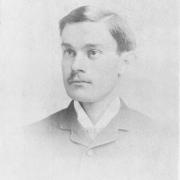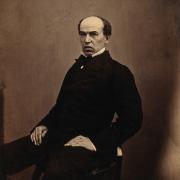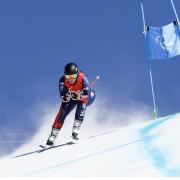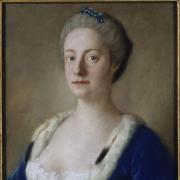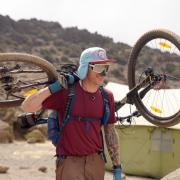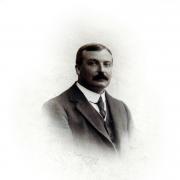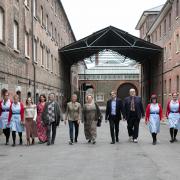Doug Packman, 93, talks at home in Tankerton about his years as an RAF flight engineer, near misses and teaching himself astro-navigation

There were tears and laughs during my morning spent with Doug Packman, who’d just celebrated his 93rd birthday a few days before my visit to his Tankerton home.
Widowed twice, he lives alone now but his life is rich with friends and extended family and his sitting room is filled with paintings and framed prints of his years with the RAF.
A prolific writer, I leave clutching a treasure trove of his wartime memories to read at my leisure, but it is his stories I want to hear for myself and we are so engrossed in one particularly hair-raising account we don’t even hear Manu come in to take photographs.
Doug’s recall of his early years is crystal sharp and despite it sounding at times desperately harsh, his repeated phrase is “I’ve had a lovely life” while “marvellous” seems to be his favourite adjective. I’ve never met a more positive, more inspiring person.

Born at the family farm near Ospringe on 10 January 1925, when he was two the family moved to the Isle of Grain so that his father could take up a job as a chauffeur and groom.
“It was a terrible winter and I contracted whooping cough which developed into pneumonia,” says Doug, an only child. “They sent for the doctor but he didn’t come for two or three days and then told my mother ‘there’s nothing I can do for him, send your man down to the surgery tomorrow to get the death certificate.’ My mum was beside herself.”
Young Douglas wanted his grandmother, and she duly battled her way from Faversham through snowdrifts up to her waist in places to see her grandson.
“My mother got her some sandwiches and a hot drink. She cut a bit of hair from the nape of my neck and put it in one of the sandwiches and told my mum, who thought her mother-in-law had gone round the bend, to give it to the first dog that came in sight along the road.

“My dad took her as far as Rochester in a pony and trap and within a week I was toddling about – she was a remarkable woman and I have always said that she saved my life.”
Having survived near death, Doug certainly made up for it with a childhood full of activity. His dad (“my hero”) taught him unarmed combat and how to shoot game; he boxed and ran long distance. His father’s employers had no grandchildren, so Doug filled the gap, receiving their son’s ‘beautiful’ cast-off clothes and presents brought back from their frequent world cruises.
He adds: “I was taking engines to pieces and putting them back together when I was 10 and I used to drive my dad’s boss’s very old Daimler to the marshes to pick him up. Dad fixed wood extension blocks so I could reach the pedals. It all stood me in good stead because when I went to engineering school, I was marvellous!”
His formal education was another matter – the village school had one class and one teacher and it was thanks to the local clergyman, Oscar George, giving him tuition twice a week for three hours (“I soaked it all up, couldn’t get enough – even Latin! It was marvellous”) that he was later able to pass his exams and join the airforce.

When war was declared in 1939, Doug left school just before his 14th birthday and went to Ashford to become a telegraph messenger boy with the aim of applying to become a trainee telegraph engineer.
Sent to Canterbury after a year to see if he was suitable material, his interviewer said it was a ‘waste of time’ training him as when he reached call-up age he’d be put in the Army and end up as gun fodder.
Deciding he would rather fly to war than fight in the trenches, Doug went back home to live with his parents and became a telegraph boy in Chatham. Even at that early stage of the war, there were many casualties and many deliveries of bad news to be made.
Turning 17 at last, and fed up ‘playing soldiers’ in the Home Guard, Doug took himself off to the RAF recruiting centre and announced that no, he didn’t want to be a pilot like his uncle in the First World War, he wanted to be a flight engineer.
“But no one had heard of it!” laughs Doug. “I knew about it because my grandmother used to get me the National Geographic magazine and there was an article in there that talked about flight engineers. Right from being a small boy reading that, I wanted to do the same.”
Doug duly passed his exams, thanks to the vicar, but had to pester the RAF for another year before he was allowed to join up at 18, after satisfying the medical board at Chatham. Who should be in charge there but the very doctor who had given him up for dead when he was a toddler!
There were to be further close brushes with death in his new life, but I can still sense, even 74 years later, Doug’s sheer excitement at finally being a Lancaster flight engineer and making friends for life among his new crew members.
“Although it was a huge plane, the Lancaster just had one pilot so he needed someone to assist him, and that was my role. I had the engines to tend to, carry out checks on the fuel levels and, in the event of the pilot being unable to fly or indeed being killed, I’d take over.
“Although I never received any training as a pilot I could – and did – fly. I was very lucky in my pilot Alec Swain and also John Chatterton, who trained us. We were his first pupils when we arrived for training at RAF Syerston finishing school in Nottinghamshire, which was used as a bomber base during the Second World War.”
It took just a week to familiarise the young NCOs to the Lancasters, then they were sent to 630 Squadron at East Kirkby and took part in 34 operations before returning to Syerston.
“One of the first chaps I ran into there was John Chatterton and he asked me to be his flight engineer, which was excellent,” beams Doug. “He was a country boy like me and we got on like a house on fire and later went on to train other crews together.”
Doug adds: “I used to take over the controls occasionally from John and it paid off. We’d taken a crew for testing and John wanted to see how the pilot landed, so he got out for a better view.
“We took off but the pilot didn’t give any instructions; he’d frozen at the wheel. I alerted the control tower and John told me ‘she’s all yours.’ This is when my skills in unarmed combat came in handy and I managed to wrench the pilot’s hands off the wheel and haul him out to the back so I could climb into his seat.
“I knew the drill, so took her up and was going to tell the boys to bale out but decided to bring her in – John later told me I made a perfect landing. That was the only time I ever landed a Lancaster and John just told me ‘Good lad’.”
Many far more dangerous operations were to follow, including a raid on Deelen airfield in Holland when Doug not only witnessed his first-ever fighter jet, a Messerschmitt ME 262, but also the horror of the Lancaster flying right next to them receiving a direct hit, killing all on board.
And in July 1944, flying with his pal Alec Swain, en route to Revigny near Paris, they too were hit, by the dreaded Schräge Musik, the name the Germans gave to upward-firing auto-cannon the Luftwaffe mounted in night fighter aircraft. On fire and in a spin, diving earthwards, Doug somehow managed to climb to the front of the plane (“it was like walking up a mountain”) and help Alec pull the control column back.
“Claude, our navigator, later told us how close we were to the tops of the houses below,” he says. “Then all of a sudden the column came back and we started to level out and then to climb. The fire abated because of the speed we were travelling at and we landed at East Kirkby as dawn was just breaking. How she had ever flown back we never knew. None of us were injured. We went out the next day in a borrowed plane and did another French target. I was just 19.”
After the war ended Doug and his crewmates got moved to 44 Squadron in Suffolk doing exodus runs bringing ex POWs back from Italy until Doug’s adjutant, a farmer, got him released on Class B to do farm work.
Despite finding his own much better-paid job working for the catchment board doing agricultural work with a dragline emptying marsh ditches, he was made to stop on the farm until 1954, earning just £3.50 a week.
The first time Doug earned any good money was when he went to work for C & A Bowers of Knockholt, as a cattle and horsebox driver. But tragedy struck when Doug’s first wife Ida died of leukaemia when she was just 36 and, now classed as a single man, he lost his agricultural council house, his wife and “the best job I’d ever had” within the space of a few days.
“My doctor advised I get away otherwise I’d be joining my wife,” says Doug. “So I got a job as a locker steward on P&O on the advice of my good friend Pegs and did 44,000 miles that year, went right round the world.
“When I finally came back Pegs met me at Tilbury Docks and we were in her car en route to my parents in Sittingbourne when I asked her to marry me. She replied ‘I never thought you were going to ask’ and drove us straight to the registry office! We married four days later and we were married 45 years. She was really super.”
Finances began to pick up in 1964 when Doug started work for American company Huyck as a product development specialist, which involved frequent trips to Europe. He bought his present home that year and has lived here ever since.
Retired at 58, Doug threw himself into new adventures. He bought a Mark IX sextant and taught himself astro-navigation, spending many happy hours at the Greenwich Observatory (“I love it there, I could live there!”) learning about the early Elizabethan and Tudor navigators.
Then a friend, Ron Powling, former chairman of Kent County Council, who had been a wing commander in the Battle of Britain, asked Doug to give a talk on his wartime memories.
He won a standing ovation for his story of witnessing at the age of 15 a Hurricane come down on St Mary’s marshes. More public speaking invitations followed and as well as writing, Doug also recorded his memories at the invitation of Lincoln University.
“My memory is fantastic for my age about my early years, but I can’t tell you what I ate for breakfast today!” he laughs.
As I’m about to reluctantly tear myself away, Doug grows suddenly serious as he impresses on me the most important thing war taught him. “Hitler and his thugs were very nasty people, but today’s word news reminds us that there are many such tyrants like Hitler. Make sure they never gain control.”




